Randal Rauser's Blog, page 159
February 16, 2016
No Eagles of Death Metal Frontman, everybody shouldn’t have guns
This morning I read in The Guardian that Jesse Hughes, the frontman for the Eagles of Death Metal — the group that was playing at the Bataclan in Paris when terrorists entered with guns and killed scores of people — has stated that “Everybody has to have guns.” Here’s the key passage:
“Did your French gun control stop a single f—–g person from dying at the Bataclan? And if anyone can answer yes, I’d like to hear it, because I don’t think so. I think the only thing that stopped it was some of the bravest men that I’ve ever seen in my life charging head-first into the face of death with their firearms.
“I know people will disagree with me, but it just seems like God made men and women, and that night guns made them equal,” he said. “And I hate it that it’s that way. I think the only way that my mind has been changed is that maybe that until nobody has guns everybody has to have them.
The silver lining in this quote is that Hughes looks for a time when nobody has guns. The dark cloud — and it’s a big dark cloud — is that until that day he believes everybody should have guns.
That’s insane. It’s completely disconnected from reality. The following story by ABC News explains why:
February 15, 2016
Chocolate Cake, Chicken, and Other Metaphors of Truth and Error
Back in 2009 when I was doing the interview circuit for my book Finding God in the Shack (a theological exploration of the themes in Paul Young’s best selling novel The Shack) I had an interesting exchange with radio host Bob Dutko. Dutko was not a fan of The Shack and viewed it as including serious theological error. And so he pitched a question to me which went like this (paraphrase):
“Now Doctor, imagine I baked a cake and mixed a little bit of poop into the batter. You wouldn’t eat that cake, would you?”
The message was clear. A little bit of error “mixed” into a book is like a little bit of poop mixed into cake batter. If you wouldn’t eat the latter, neither should you read the former.
This wasn’t the first time I’d heard this analogy. In the past I had frequently heard Christians invoke the same illustration to warn against the consumption of all media with any content that might be deemed morally or theologically objectionable.
As popular as the poop-in-cake metaphor is with some Christians (not to mention fans of The Help!), alas it is deeply flawed. Eating a cake is not analogous to reading a book. Rather, it is analogous to assimilating the claims of a book. But here’s the problem: while one can’t eat a bite of cake without consuming all the ingredients of the batter, one can read a book without assimilating all its claims.
A few weeks after the Dutko interview I was doing another radio interview with Dr. Alvin Jones. It didn’t take long to discover that Dr. Jones was far more positive toward The Shack than Bob Dutko. So I shared Mr. Dutko’s metaphor and invited Dr. Jones to share his response.
On his website Dr. Jones promotes himself as “The Most Trusted Name in Wisdom,” and if that is a lofty promise, in this case at least he proved his wisdom. Without missing a beat, he replied (once again this is my paraphrase):
“I don’t think it’s like cake. I think it’s like fried chicken. With a piece of chicken, you eat the meat and you leave the bone!”
Exactly! Just as you don’t need to eat the entire piece of chicken on your plate, so you don’t need to agree with every aspect of a book. When you eat the chicken, you keep your eyes (and teeth) out for bones and you leave those behind. And when you’re reading a book, the discriminating reader will likewise keep his or her eyes out for the “literary bones”, and leave those behind as well.
February 14, 2016
Did the Church of England troll Richard Dawkins?
Following reports of Richard Dawkins’ minor stoke this past Friday, the Church of England promptly tweeted a call for church goers to pray for Dawkins:

According to an article in The Guardian, several of Dawkins’ followers promptly accused the church of “trolling”. (“Trolling” involves making online posts that are intentionally offensive in order to anger and alienate others.)
Ironically, the only trolls in this story are the very individuals who are levelling the charge. The Church of England regularly tweets requests for prayers for people in need. (Note to militant secularists: asking for prayer is one of the many ways that Christians express care and concern for others, just in case you didn’t know.) To suggest that this tweet in particular was in fact a mean spirited jab at Dawkins is perverse in the extreme.
Sadly, I’m not surprised that a well meaning tweet is being twisted. After all, many of Dawkins’ new atheist followers are notoriously hostile toward all folks of religious faith. When you are used to mocking and belittling others, it is natural to interpret the kind well wishes of the very people you mock and belittle as passive-aggressive gestures to respond in kind until even a prayer of concern and well wishes becomes something ugly and nefarious.
One might hope that those very individuals who are so preconditioned to interpret everything pertaining to religious faith in such a negative manner might use this as an occasion to re-examine their own irrational and emotionally driven biases.
Yes, one might hope…
February 13, 2016
Is Life Meaningless without God? A Look at Andy Bannister’s Arguments
Andy Bannister is the director and top apologist of RZIM Canada and author of The Atheist Who Didn’t Exist. In the following 3 minute video (part of a lengthy series of similar videos) he argues that life is meaningless without God.
So what should we say about Andy’s argument?
To begin with, Andy opens with the question of whether one can be “good without God”. That is a question of moral value and it should be distinguished from questions pertaining to existential meaning. Admittedly, the two are linked (and depending on how one cashes out existential meaning, they could be equated), but conceptually they are nonetheless distinct. The same goes for meaning and purpose. They also are conceptually distinct, though they could be equated or otherwise linked in a particular account.
Andy then turns to discuss meaning and purpose (which he appears to treat as synonyms). He says that for purpose to “really be true” it has to be “given”. A rock on a beach, for example, is the product of blind, undirected forces and as such as no purpose in itself. It is only when a person takes the rock and appropriates it for a use that it gains a meaning. Andy then observes:
“If there is no God to grant purpose to our lives we are in the same position as the rock on the beach.”
I understand that this is a three minute video, but that doesn’t mean it is immune to critique. So let me note a few problems with leaving the analysis at this point.
First, Andy has presented one account of meaning — a teleological account — without defending the claim that the teleological account is the only viable account. Needless to say, there are substantive non-teleological accounts of meaning on offer which don’t appeal to deity, and until they are rebutted Andy’s job isn’t done.
Here’s one non-theistic possibility. One begins by endorsing a Platonic moral realism: in other words, the catalogue of existence includes quarks, scientific laws, space, and moral value/disvalue which is exemplified in the intentional actions of moral agents. Once we’ve recognized the existence of a Platonic Good, one can argue that “meaning” consists of becoming the kind of person who lives their life in greater conformity to moral value. This would be an account that links existential value with moral value. And note that it doesn’t require the person to say that they were designed to live morally.
And what about relative accounts of meaning or purpose? Let’s assume for the moment that meaning/purpose are teleological in nature. Why can’t the meaning or purpose derive from society? I know what you’re thinking: cultural relativism. Well, this could be a form of cultural relativism. (Keep in mind: we can’t assume by fiat that cultural relativism is a non-starter. It too must be rebutted.) But an account that traces meaning or purpose to societies could also be melded to the Platonic moral realism I referenced above in which case the individual would have rational grounds to prefer or prioritize the meaning bequeathed by cultures that live in greater conformity to the Good.
Second, Andy never explains what it is about God’s imputing of purpose to an agent which gives it unique authority. As a theologian I understand that the word “God” functions as an end to explanation. But Andy should explain how he believes that God’s attribution of meaning to the creature is uniquely authoritative.
Does God have that unique power to impute meaning/purpose to entities in virtue of having created those entities? That is problematic. After all, Andy’s illustration of meaning/purpose consists of Andy imputing meaning/purpose to a rock that he didn’t create.
Or could it be that God has that unique authority because God is also the source of moral value? If Andy wants to argue this, he needs to address the Euthyphro objection. So yeah, it’s complicated.
Let’s turn to Andy’s second argument which begins at approximately one minute into the video:
“Whatever meaning you invent for your life, the outcome is precisely the same. On atheism you will die, your children will die…”
Andy goes on to explain how the universe will eventually come to an end. And he caps it off with a famous quote from Bertrand Russell that the soul’s habitation can only be built on despair.
But let’s hold on for a moment. Just because Russell says something it doesn’t follow that others are obliged to agree with him. Imagine an atheist quoting John Piper — or C.S. Lewis, or Franklin Graham, or Karl Barth — and then assuming that every Christian is obliged to agree with Piper (or Lewis or Graham or Barth). Nuh uh. Just because somebody says something doesn’t mean others are obliged to agree.
As for the argument itself, Andy seems to assume that if you and those you love do not exist forever then life has no meaning. But there are good reasons to reject this claim. Let me give two such responses, the first of which will appeal to atheists and the second to Christians.
First, an atheist could reply like this: “Okay, but in mainstream Christianity people go to one of two possible states in the afterlife: eternal joy and bliss or unimaginable torment. And since no person can be absolutely certain that they are saved, you Christians are playing double or nothing. The thought that I might end up in eternal torment is a terrifying prospect. By contrast, the finitude of life ending in annihilation is a calming assurance.”
Next, let’s consider the response specifically for the Christian. We can begin by noting that Andy’s second argument adds an additional criterion to his teleological account of meaning or purpose. In addition to the original imputation of purpose granted by the original creating agency, Andy’s analysis also requires that the human person continue to exist forever. Should a Christian accept this?
No. Consider that this entails that counterfactually had God created human beings to live lives of goodness and love for a finite period after which they would cease to exist, that their lives would thereby have lacked meaning or purpose.
But this seems clearly false. In that world of divinely superintended finite human existence there would still be love, relationship, friends, good food, fine wine, dazzling sunsets, sparkling snowcapped mountain peaks, journeys, joy, holidays, culture, forgiveness, healing, and altruism. Why wouldn’t that be sufficient for meaning and purpose? Why couldn’t a person live a life like this and die old and full of years, having lived a great life imbued with meaning and purpose which then lapses into non-existence?
It seems to me that such a life would indeed by meaningful and purposeful. Thus, I conclude that Andy’s claim is false: it is not necessary that a life must endure eternally for that life to have meaning or purpose.
February 11, 2016
A Christian and Atheist Dialogue and Debate: My new book with Justin Schieber
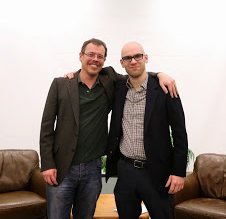
Randal and Justin
Today I signed a contract with Prometheus Books, the preeminent secular/atheist/humanist publisher in the world. Tentatively titled The Biggest Question, the book is being co-authored by atheist Justin Schieber. Justin needs no introduction to (most) readers of this blog. He currently runs the Real Atheology YouTube Channel which provides top notch short and engaging introductions to various topics in philosophy of religion. Previously Justin was cohost of the beloved radio show and podcast Reasonable Doubts. He is also a well known atheist debater. (Last year I debated Justin at the University of Alberta. You can watch that debate here.)
I am really excited about this book for three reasons.
First, Justin is a great interlocutor, informed on the issues, and keen to spread more light than heat. And that’s certainly where I am these days. I used to invest (aka waste) way too much time engaging people who were keen to insult and condescend. Those conversations tend to amount to little more than feeding the troll.
By contrast, Justin takes theism seriously and understands the complexities of the issues. (I am especially heartened that Prometheus shares our vision for the kind of irenic and mutually respectful exchange that Justin and I are having in this book.)
Second, Justin and I have chosen a conversational format that very much echoes a real world conversation not unlike what you might overhear in a coffee shop or a pub. As such, the book forges a user-friendly middle ground between readability and rigorous content.
Finally, in The Biggest Question Justin and I take on some topics that are under-represented in the literature. This is not yet another exchange of cosmological arguments, intelligent design, and the evidential problem of evil.
Currently, we have completed approximately 1/3 of the book and hope to submit the completed manuscript in a few months.
So stay tuned!
February 9, 2016
A Limited Appetite for Wonder
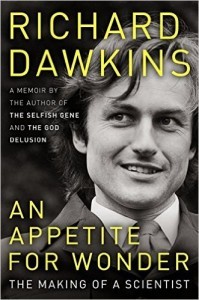 There is no doubt that Richard Dawkins has an appetite for wonder. The title of his memoir tells us so. If that’s too cheeky, then let me hasten to add that I have no doubt he does have an appetite for wonder. While I haven’t read Dawkins’ memoir, I have read several of his other books and he is a writer who narrates his wonder at existence not merely with eloquent prose, but with an intoxicating giddiness that borders on the spiritual.
There is no doubt that Richard Dawkins has an appetite for wonder. The title of his memoir tells us so. If that’s too cheeky, then let me hasten to add that I have no doubt he does have an appetite for wonder. While I haven’t read Dawkins’ memoir, I have read several of his other books and he is a writer who narrates his wonder at existence not merely with eloquent prose, but with an intoxicating giddiness that borders on the spiritual.
So if the concern is the processes and structures of the material universe — that which is conventionally described as “nature” — Dawkins’ appetite for wonder can stand with the best of them.
Here’s the problem: when it comes to matters that transcend the precincts of nature — including the fields of ethics, metaphysics, and theology — Dawkins’ wonder seems to hit a brick wall. Suddenly, the same individual who is intoxicated by the wonder of one sphere of existence, exhibits a bewildering confidence about, and disinterest in, the nature of existence beyond this realm.
In my book, that still qualifies as an appetite for wonder, but it is an appetite that is tragically limited.
February 7, 2016
84. Is belief in God rational? A Christian and atheist in debate

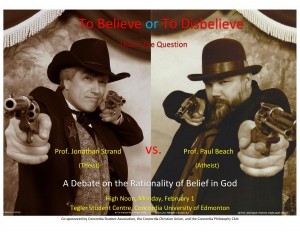 The existence of God is one of the perennial questions of philosophical inquiry. Indeed, in the minds of many, it is the very greatest question one can ask.
The existence of God is one of the perennial questions of philosophical inquiry. Indeed, in the minds of many, it is the very greatest question one can ask.
But not everyone agrees. While the existence of God may have long occupied the spotlight, the critics believe that that time is past. The time has now come to leave belief in God behind and to join the rational, scientifically literate, secular denizens of the 21st century. Belief in God, says the critic, is no longer a rational option for the thinking person.
So how is this disagreement ever going to be settled?
Simple: a debate! 
February 6, 2016
Why Christian presidential candidates need more Christianity in their campaigns
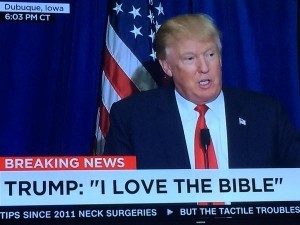 If you’re following the American race for the White House, you might be excused for mistaking the candidates for itinerant preachers. And I’m not just talking about Mike Huckabee. Even Donald Trump has taken to waving a Bible as he publicly mulls over the profundity of Two Corinthians.
If you’re following the American race for the White House, you might be excused for mistaking the candidates for itinerant preachers. And I’m not just talking about Mike Huckabee. Even Donald Trump has taken to waving a Bible as he publicly mulls over the profundity of Two Corinthians.
This kind of behavior has led to many commentators lamenting the extent to which Christian (and nominally Christian) candidates are acting Christian on the campaign trail. In an interesting New York Times article published just yesterday, “Sick and Tired of ‘God Bless America’,” Susan Jacoby critiques this pandering to religion. She points out that according to the Pew Research Center, those who do not belong to any religious group (i.e. the “nones”) has swelled from 21 million in 2008 to 36 million today. To be sure, many nones would count themselves “spiritual” and some would believe in God, but they are all tacitly excluded by the candidates’ perpetual waving of their Christian credentials.
My main quibble with the article is that it focuses on the exclusion of the nones. But how many Buddhists perceive themselves to be included by candidates who consistently stump in Christianese? What about Hindus? Sikhs? (To say nothing of Muslims!)
Not only is the focus exclusive, but Jacoby points out that it also arbitrarily limits concerns for religious freedom to those of an avowed religious belief:
Freedom of conscience for all — which exists only in secular democracies — should be at the top of the list of shared concerns. Candidates who rightly denounce the persecution of Christians by radical Islamists should be ashamed of themselves for not expressing equal indignation at the persecution of freethinkers and atheists, as well as dissenting Muslims and small religious sects, not only by terrorists but also by theocracies like Saudi Arabia. With liberal religious allies, it would be easier for secularists to hold candidates to account when they talk as if freedom of conscience is a human right only for the religious.
I agree with Jacoby that Christian (and nominally Christian) candidates should stop exploiting their Christian faith on the campaign trail. But that doesn’t mean they should stop being Christian. Indeed, in my view the exclusivist appeals to Christian faith that have become the norm are not Christian enough. Lest I be misunderstood, I’m not suggesting these candidates need to avail themselves of more appeals to religion. Rather, they need to acquaint themselves with the oft neglected Christian virtue of hospitality.
In her book Making Room: Recovering Hospitality as a Christian Tradition (Grand Rapids: Eerdmans, 1999) Christine Pohl offers an incisive challenge to Christians to rediscover the virtue of hospitality which is so central to the Christian tradition. Her analysis is particularly incisive in chapter four, “Hospitality, Dignity, and the Power of Recognition.” Pohl writes:
“Although we often think of hospitality as a tame and pleasant practice, Christian hospitality has always had a subversive, countercultural dimension.” (61)
“Because the practice of hospitality is so significant in establishing and reinforcing social relationships and moral bonds, we notice its more subversive character only when socially undervalued persons are welcomed. In contrast to a more tame hospitality that welcomes persons already well situated in a community, hospitality that welcomes ‘the least’ and recognizes their equal value can be an act of resistance and defiance, a challenge to the values and expectations of the larger community.
“People view hospitality as quaint and tame partly because they do not understand the power of recognition.” (62)
Pohl goes on to refer to the welcome of “inconvenient strangers” (64) as part of the call of every Christian. And that certainly includes the 36 million inconvenient strangers who hold no faith and find themselves excluded by presidential candidates who include appeals to “God”, “church”, “faith” or “religion” in every second sentence.
Imagine the power of recognition that would come with a Christian presidential candidate setting aside exclusivist pandering to a religious interest group and instead campaigning in a way that includes all ethnic, cultural, religious, and non-religious groups. That certainly would be subversive, countercultural … and Christian.
February 4, 2016
Wouldn’t it be nice? A review of Love and Mercy
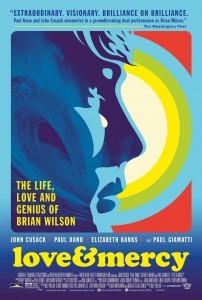 If there is a timeless soundtrack for an endless summer of carefree youth, joy, and innocence, it is found in the music of The Beach Boys. I should know: I’ve been a fan for more than thirty years. Growing up in the eighties I whiled away the summer listening to the intoxicating melodies of “Good Vibrations” and “Surfin’ USA”. At the Bible camp talent show in grade 9 I even performed a Christianized version of “Surfin’ Safari” with my friend J.P.:
If there is a timeless soundtrack for an endless summer of carefree youth, joy, and innocence, it is found in the music of The Beach Boys. I should know: I’ve been a fan for more than thirty years. Growing up in the eighties I whiled away the summer listening to the intoxicating melodies of “Good Vibrations” and “Surfin’ USA”. At the Bible camp talent show in grade 9 I even performed a Christianized version of “Surfin’ Safari” with my friend J.P.:
“Everybody’s sinnin’ now, got some souls for winning now
“Let’s pray for revival today!”
Oy vey!
And all the while, I never grasped the tortured genius that lay behind the music.
A hint came in 1992 with a hit song by the Canadian band The Barenaked Ladies (none of whom are naked … or ladies). The memorable chorus of “Brian Wilson” goes like this:
“I’m lying in bed just like Brian Wilson did”
What? Brian Wilson was lying in bed? Why? For how long?
To discover that the joyful and carefree sounds of youth were borne of a very dark place was something of a revelation. Alas, it was Brian Wilson who introduced me to the phenomenon of the tortured genius.
So when Smile, Brian Wilson’s fabled follow-up to the masterpiece Pet Sounds was finally released in 2004 — after close to a thirty year gestation period — I snapped it up. But questions remained. I knew Brian had been sick. I knew he was now better. But how did Brian end up lying in bed in the first place? And how did he ever manage to recover sufficiently to record the masterful Smile?
We find the answers in Love and Mercy, the brilliant bio-pic released in June 2015. The film takes the unusual step of casting two different actors to portray mid-1960s Brian (Paul Dano) and mid-1980s Brian (John Cusack). While I was initially skeptical, I’m delighted to say that the casting was itself a work of genius as illustrated in the way each actor manages to channel Brian’s pathos, genius, and faltering steps toward redemption. (And with squinting eyes and a little imagination Cusack pulls off Dano + twenty years.)
As a bonus, Dano and Cusack are complemented by outstanding supporting work from Elizabeth Banks and the ever-watchable Paul Giamatti as the nefarious Dr. Eugene Landy. (Bwa-ha-ha-ha!)
So here’s a thought. In exchange for all the gifts we receive from the tortured genius of a Mozart, van Gogh, or Brian Wilson, wouldn’t it be nice if eventually their pains were healed? Wouldn’t it be nice if they could emerge from their dark night of the soul? Wouldn’t it be nice if, at the end of it all, they finally found love and mercy?
Wouldn’t it be nice?
Ted Cruz and Climate Change Denial
The documentary Merchants of Doubt provides an excellent primer explaining how spin doctors propagate misinformation. What is especially interesting is the close parallel between the methods of big tobacco and of big oil. For years, the former denied a link between tobacco and cancer. The latter has similarly denied a link between the burning of fossil fuels and climate change. The film illustrates how climate change deniers have three levels of argument:
(1) There is no warming of the climate.
(2) There is warming of the climate but it is not linked to the burning of fossil fuels.
(3) There is warming of the climate, it is linked to the burning of fossil fuels, but it is too economically costly to stop it.
Yesterday at a campaign stop in New Hampshire, Ted Cruz firmly placed himself with (1) by dismissing climate change as based on “pseudo-science”.
Wow, really? According to NASA,
“Multiple studies published in peer-reviewed scientific journals show that 97 percent or more of actively publishing climate scientists agree: Climate-warming trends over the past century are very likely due to human activities.” (source)
And yet, this politician cavalierly dismisses that 97 percent consensus not merely as wrong but as basing their conclusions on pseudo-science.
I’m left with two possibilities. Either Cruz is a flat out liar or he is self-deceived to a staggering degree. I haven’t yet decided which is worse.




